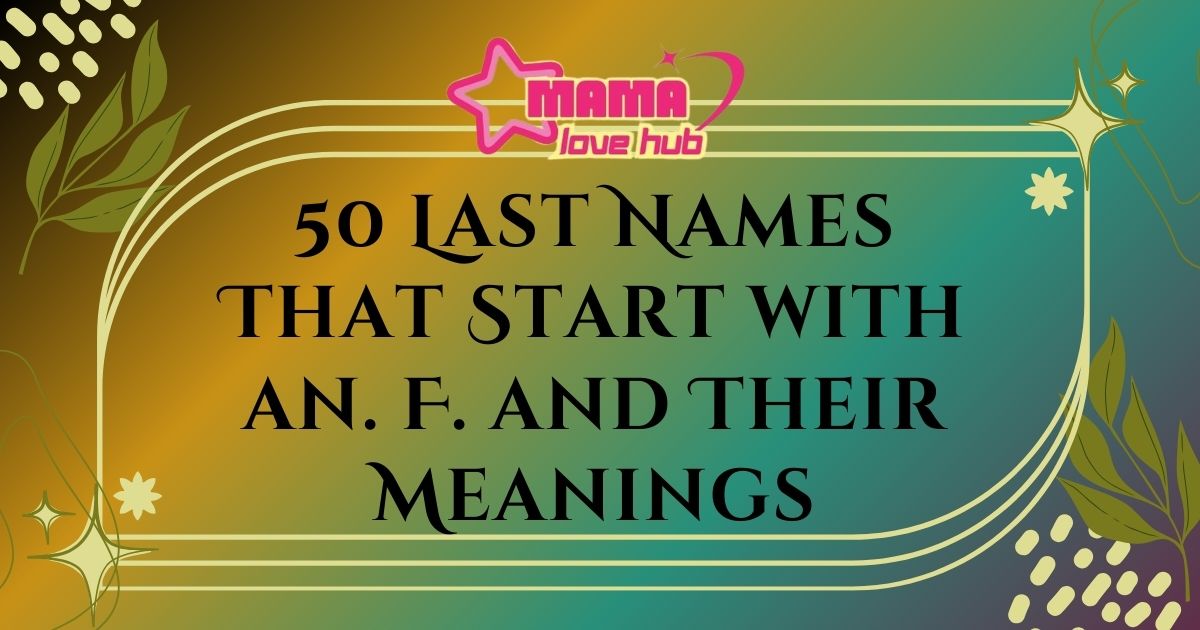50 Last Names That Start with an F and Their Meanings
Introduction
A rich tapestry of history, culture, and identity is woven into last names. They often reflect the lineage, professions, or characteristics of our ancestors. Among the plethora of last names, those starting with the letter ‘F’ hold a unique charm and historical significance. This article delves into the meanings and origins of 50 notable last names that start with ‘F’.

Historical Significance of Last Names
Surnames have been in use for centuries, evolving from the need to identify individuals beyond their given names. Initially, surnames often denoted a person’s occupation, place of origin, or a characteristic feature. Over time, they have become an integral part of our identities, linking us to our heritage and ancestry.
Cultural Importance of Last Names That Start with an F
Last names beginning with ‘F’ hold significant cultural value, reflecting historical occupations, geographic origins, and social statuses. Names like Faulkner (falconer) and Fletcher (arrow maker) highlight ancestral professions, while Ford (river crossing) and Forbes (field) denote geographic ties. These surnames often indicate lineage, such as Fitzgerald (“son of Gerald”), emphasizing familial heritage. Understanding these names provides insights into our ancestors’ lives, linking us to rich traditions and diverse histories, thereby enhancing our cultural identity and sense of belonging.
The Letter ‘F’ in Surnames
Last names beginning with the letter ‘F’ are not as common as some other letters, which adds to their uniqueness and charm. The phonetic appeal of ‘F’ lends these surnames a distinctive and memorable quality.
List of Last Names Starting with F and Their Meanings

Faulkner
The surname Faulkner is of Old French origin, derived from “fauconier,” meaning “falconer.” It referred to a person who kept and trained falcons.
Ferguson
Of Scottish and Irish origin, Ferguson means “son of Fergus,” with Fergus itself meaning “man of force” or “strong man.”
Fitzgerald
This Anglo-Norman surname means “son of Gerald.” It has roots in the Old French and Germanic personal name Gerard, which means “rule of the spear.”
Fleming
Originating from the Old French word “flamanc,” meaning “a Fleming,” this surname was used for people from Flanders, a region now divided between Belgium, France, and the Netherlands.
Ford
A simple yet classic English surname, Ford is derived from the Old English word “ford,” meaning a river crossing.
Foster
This surname has English roots and comes from the Old French “forster,” meaning “forester” or “keeper of the forest.”
Franklin
Franklin is an English surname derived from the Middle English word “frankeleyn,” meaning “a free man.”
Freeman
An English surname, Freeman was used for someone who was not a serf or bonded laborer.It represents a liberated individual.
Fry
This English surname comes from the Old Norse word “frjá,” meaning “free.”
Frost
Of Old English origin, Frost was likely a nickname for someone with a cool or icy demeanor.
Fuller
An English occupational surname, Fuller referred to someone who cleaned and thickened woolen cloth by beating it in water.
Foley
This Irish surname means “plunderer,” derived from the Gaelic “Foghladha.”
Faber
Originating from Latin, Faber means “smith” or “artisan.” It is a common surname in Germany and the Netherlands.
Farr
This English surname likely comes from the Old English word “fearn,” meaning “fern.”
Farrell
An Irish surname, Farrell means “man of valor,” derived from the Gaelic name “Fearghal.”
Fenton
Fenton is an English surname from places named Fenton in Staffordshire, Lincolnshire, and Northumberland. It means “fen farm.”
Fitzpatrick
This Irish surname means “son of Patrick.” Patrick itself is derived from the Latin name “Patricius,” meaning “nobleman.”
Field
An English surname, Field refers to someone who lived or worked in the fields.
Fischer
A German and Jewish (Ashkenazic) occupational name for a fisherman, derived from the German word “fisch” meaning “fish.”
Fink
The Middle High German word “vink,” which means “finch” (the bird), is the source of this surname’s German heritage.
Flint
An English surname referring to someone who lived near a significant outcrop of flint or worked with flint.
Last Names Starting with F and Their Meanings

Fontaine
A French surname meaning “fountain” or “spring,” used for someone who lived near a spring or well.
Forbes
Of Scottish origin, Forbes is derived from the Gaelic word “forbhas,” meaning “field” or “district.”
Foreman
This English occupational surname referred to the head servant of a household or estate.
Foster
While already mentioned, it is worth noting that Foster can also be an anglicized form of the Gaelic surname “Mac an Fhúistéir,” meaning “son of the forester.”
Fox
An English surname likely used as a nickname for a person who was cunning or had red hair, resembling a fox.
Francis
This surname of Latin origin means “Frenchman” or “free man.”
Frank
Of German and Jewish origin, Frank means “free.” It was also used to refer to a member of the Germanic tribe, the Franks.
Fraser
A Scottish surname, Fraser might have originated from the French word “fraisier,” meaning “strawberry plant.”
Freedman
This English surname was used for a man who had been freed from serfdom or slavery.
French
This English surname was used for someone from France or someone who spoke French.
Frost
While already mentioned, Frost can also be an occupational surname for someone who dealt with frozen goods or worked in icy conditions.
Funk
Of German origin, Funk is derived from the Middle High German word “funke,” meaning “spark.” It could have been a nickname for a lively person.
Faber
While already covered, it is notable that Faber can also refer to a maker of small objects, not just a smith.
Fenton
Covered earlier, but worth noting that Fenton also means “settlement on the marsh.”
Ferris
An English surname derived from the given name Ferris, meaning “ironworker.”
Fowler
This English occupational surname referred to a bird-catcher or hunter of wildfowl.
Finley
Of Scottish origin, Finley means “fair warrior,” derived from the Gaelic name Fionnlagh.
Fanning
An Irish surname, Fanning is derived from the Gaelic word “fionn,” meaning “fair” or “white.”
Farlow
This English surname comes from the Old English words “faerh,” meaning “pig,” and “hlaw,” meaning “hill.”
Fisher
Already mentioned, but Fisher also denotes a person who trades in fish.
Forester
An English surname referring to someone who worked or lived in a forest.
Francisco
A Spanish and Portuguese surname meaning “Frenchman,” derived from the Latin name Franciscus.
Freund
A German and Jewish (Ashkenazic) surname meaning “friend.”
Fitzsimmons
An Irish surname meaning “son of Simon,” derived from the given name Simon.
Floyd
An Anglicized form of the Welsh surname Lloyd, meaning “gray-haired.”
Farley
An English surname meaning “fern clearing,” derived from the Old English words “fearn” and “leah.”
Fallon
An Irish surname meaning “leader” or “superior,” derived from the Gaelic word “follamhnach.”
Firth
An English surname for someone who lived near an estuary or fjord, derived from the Old Norse word “fjǫrðr.”
Farrington
An English surname from a place name meaning “settlement of Fera’s people.”
Conclusion
Last names starting with ‘F’ encompass a diverse array of meanings and origins, reflecting the rich tapestry of human history and culture. From occupations and physical traits to places of origin and personal characteristics, these surnames offer a fascinating glimpse into the past and continue to shape our identities today.
FAQs
What is the most common last name starting with ‘F’?
The most common last name starting with ‘F’ is likely “Foster,” which is prevalent in English-speaking countries.
Are there any famous people with last names starting with ‘F’?
Yes, many famous individuals have last names starting with ‘F,’ including Benjamin Franklin, Ella Fitzgerald, and Harrison Ford.
How do surnames influence personal identity?
Surnames often carry cultural and familial significance, influencing one’s sense of heritage and identity.
Can last names provide clues about family history?
Yes, last names can offer insights into one’s ancestry, including geographic origins and occupations of ancestors.
How have surnames evolved over time?
Surnames have evolved due to changes in language, migration, and cultural integration, reflecting the dynamic nature of human societies.

